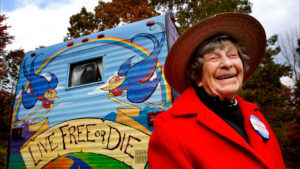
Granny D
Can one do extraordinary things late in life, if one becomes driven by a public cause? Granny D showed us that it was possible.
In her early years, Doris Haddock (1910-2010), who came to be known as Granny D, was housemaker, who raised two children during the Great Depression and later worked at a shoe company for twenty years. She was, however, active in community affairs. In 1960, she and her husband, Jim, helped stop the planned testing of hydrogen bombs in Alaska, saving an Inuit fishing village at Point Hope.
It was, however, well after becoming a grandmother that Granny D became famous for her political activities. She and her husband had retired to Dublin, New Hampshire, where Jim died of Alzheimer’s disease. Instead of giving in to grief, Granny D became a liberal activist for the reform of election campaign finance.
In 1995, the first attempt made by Senator McCain and Senator Feingold to remove unregulated “soft” money from election campaigns ended in failure. In response, Granny D led a petition movement for the reform, but she wanted to do something more effective.
On January 1, 1999, at the age of 89, Granny D began a 3200–mile walk across the US to demonstrate her concern for the issue, walking ten miles each day for fourteen months. She became instantly famous and the campaign finance issue gained nationwide attention.
Granny D traveled just as the Peace Pilgrim did – walking until given shelter and fasting until given food. Thanks to the unflagging generosity of strangers she met along the way, however, Doris never went without a meal or a bed. She trekked through over 1000 miles of desert, climbed the Appalachian Range in blizzard conditions, and even skied 100 miles after a historic snowfall made roadside walking impossible.
Along her way, her remarkable speeches, rich with wisdom, love, and political insight, transformed individuals and communities and jump-started a full-blown movement. She said, “There’s a cancer, and it’s killing our democracy. A poor man has to sell his soul to get elected. I cry for this country.” During her journey, Granny D kept a diary, tracking the progress of her walk and recalling events in her life and the insights those had given her.
After 14 months of walking, when she arrived in Washington D.C. on February 29, 2000, Granny D was met by 2200 supporters representing a wide variety of reform groups. Several dozen members of Congress walked the final miles with her. It took two more years to gain passage of the McCain-Feingold Bill, during which time Granny D engaged in walking fasts around the Capitol, organized rallies in many states, and held demonstrations that twice landed her in jail.
That was not the end of her political career. In 2003, at the age of 93, Granny D drove around the country on a 22,000-mile voter registration effort targeting working women and minorities. Then, in June 2004, the presumed Democratic nominee for US Senate in New Hampshire dropped out of the race days before the filing deadline. Granny D, 94 years old and still eager to “raise a little hell,” surprised everyone by deciding to challenge the Republican incumbent. Her insurgent, grassroots campaign defied all expectations, but she lost the election.
Granny D died on March 9, 2010, at the ripe age of 100. She is remembered by politicians, journalists, and countless friends and admirers across the US for her uplifting rhetoric, her feisty down-to-earth spirit, and her unflinching commitment to the cause of democracy for all.
Afterword: Granny D wrote three books (along with Dennis Michael Burke) describing her life and work: Granny D: Walking Across America in My Ninetieth Year; Granny D: You’re Never Too Old to Raise a Little Hell; Granny D’s American Century. In 2006, Alidra Solday made the documentary Granny D Goes to Washington.
Tragically, just before she died, the campaign reform laws for which Granny D fought so hard were overturned by the US Supreme Court in January 2010 in the Citizens United v. Federal Election Commission case. The controversial decision reversed century-old campaign finance restrictions and enabled corporations and other outside groups to spend unlimited funds on elections.

Whatever may have been the end result, there was this brave lady fighting with a cause for reforms. Bold indeed to have walked 3200 miles to sensitise people for what she believed to be a necessity for reforming elections. It is important to note anguish in her words, “There’s a cancer, and it’s killing our democracy. A poor man has to sell his soul to get elected. I cry for this country.” India is no different.